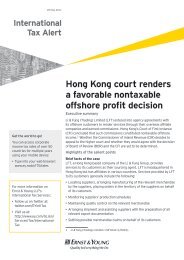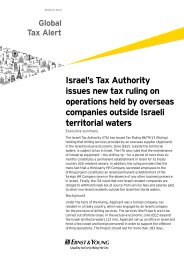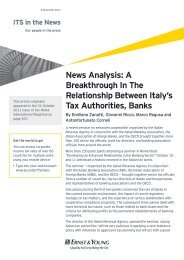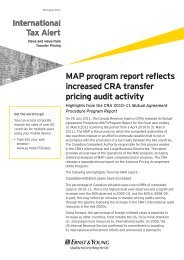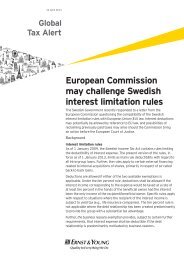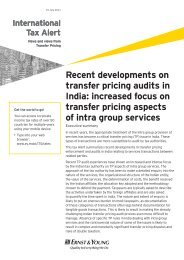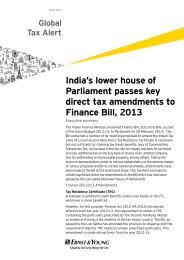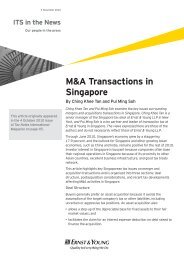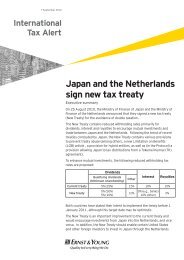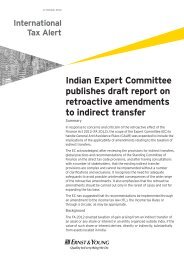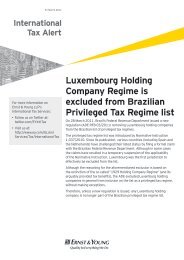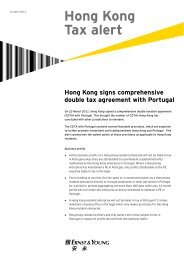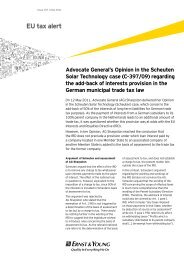Download - Ernst & Young T Magazine
Download - Ernst & Young T Magazine
Download - Ernst & Young T Magazine
You also want an ePaper? Increase the reach of your titles
YUMPU automatically turns print PDFs into web optimized ePapers that Google loves.
Management The reintegration process Credit: Corbis / Xinhua Press / Zhang Jinqiao<br />
Diageo’s global expansion into many new global markets has been supported by its detailed expatriate management programme.<br />
Global growth<br />
Diageo now trades in<br />
approximately 180 markets<br />
globally, employing a<br />
workforce of almost 20,000<br />
people, with dedicated<br />
offices in 80 countries.<br />
returning to a company where there are fewer<br />
senior positions to fill. “Companies send<br />
managers on expatriate assignments with the<br />
expectation that they will fill another more<br />
senior position upon their return,” says Festing.<br />
“But with many companies either downsizing or<br />
cutting back on expansion plans, there’s often no<br />
position available.”<br />
Another common problem is that returning<br />
executives experience a sense of loss or<br />
diminishment. As David Rooney, an Executive<br />
Director in Human Resources at <strong>Ernst</strong> & <strong>Young</strong> in<br />
Frankfurt explains: “Expatriates on assignment<br />
away from the headquarters are treated almost<br />
regally. The company will often attend to – and<br />
pay for – many of their needs, from housing and<br />
transportation to their children’s education.<br />
Their total reward will typically be higher than in<br />
their home country.”<br />
Returning executives can feel deflated<br />
because there may be a perception that they<br />
have less influence than they had overseas.<br />
“Expatriates are often big fish in a small pond,”<br />
says Rooney. “When they come back, they return<br />
to a big pond. They may be a bigger fish than<br />
when they departed but, overall, they are often<br />
left feeling as though they’ve been demoted.”<br />
There are other potential problems.<br />
Sometimes an expatriate, away for a long<br />
assignment, no longer feels at home upon<br />
return. They have established strong<br />
connections with the country they have just left.<br />
In addition, they may realize that their skills or<br />
abilities, no matter how well developed during an<br />
offshore assignment, no longer align with the<br />
organization’s needs. In these situations, it is<br />
unsurprising that these executives will actively<br />
Returning executives may feel<br />
deflated, perceiving less influence<br />
than when abroad<br />
seek a way to return to their former standing or<br />
location. “They want what they’ve lost and, if the<br />
parent company can’t provide such an<br />
opportunity, they begin to look elsewhere,” says<br />
Rooney.<br />
Stemming the loss<br />
Addressing the problem starts with the selection<br />
process. Companies need to set expectations<br />
carefully and ensure that expatriates are aware<br />
that there is no guarantee of promotion on return.<br />
There should be a similar discussion about<br />
compensation. Although an executive may be well<br />
42 T <strong>Magazine</strong> Issue 07 <strong>Ernst</strong> & <strong>Young</strong>



